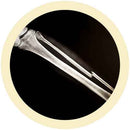Description
Giant Microbes Plush - Broken Bone
These Giant Microbes Dolls are a Million times their Actual Size! GIANT microbes are health and science products for humorous, educational, collectible, and Smart fun! Products include printed cards with fun fascinating facts. Unique gifts for students, scientists, teachers, health professionals & anyone with a healthy sense of humor!
All About Broken Bone
Millions of people break a bone each year, and most of us will at some point in our lives. For the young, a broken wrist is the most common. For the elderly, the big concerns are hip, forearm, and vertebral fractures. Excellent get well gift for people post-surgery and for wishing someone a speedy recovery.
FACTS: Millions of people break a bone each year, and most of us will at some point in our lives. For the young, a broken wrist is the most common. For the elderly, the big concerns are hip, forearm, and vertebral fractures.
Bones protect internal organs, store minerals, and give your body structure. They are made of an intricate edifice of mineralized tissue laid down by bone cells, or osteocytes. Although out of view, bones are alive and should be treated well. You will lead a happier skeletal life when you exercise and eat foods rich in calcium and vitamin D. Your 40 billion osteocytes can live for decades, but bones do weaken with age. As your body breaks down old bone and rebuilds it with stronger material, some bone matter is lost. Osteoporosis is the condition when bones become weak and are more susceptible to breaking. Worldwide, osteoporosis affects hundreds of millions of people and causes nearly 10 million fractures annually. For those over the age of 50, this occurs in 30% of women and 20% of men.
When you break a bone, medical professionals will immobilize it with a cast or brace until it heals. There are also many modern procedures to reposition shifted bones. In ancient times, however, the techniques were a lot rougher. A surgeon would use his hands to push fractured parts back together. Fragments that pierced through the skin were simply pushed back into the body or extracted. Of course, this was done without any pain killers. Anesthesia was invented in the 1840s, creating numbingly wonderful years for broken bones
Payment & Security
Payment methods
Your payment information is processed securely. We do not store credit card details nor have access to your credit card information.
Security





















